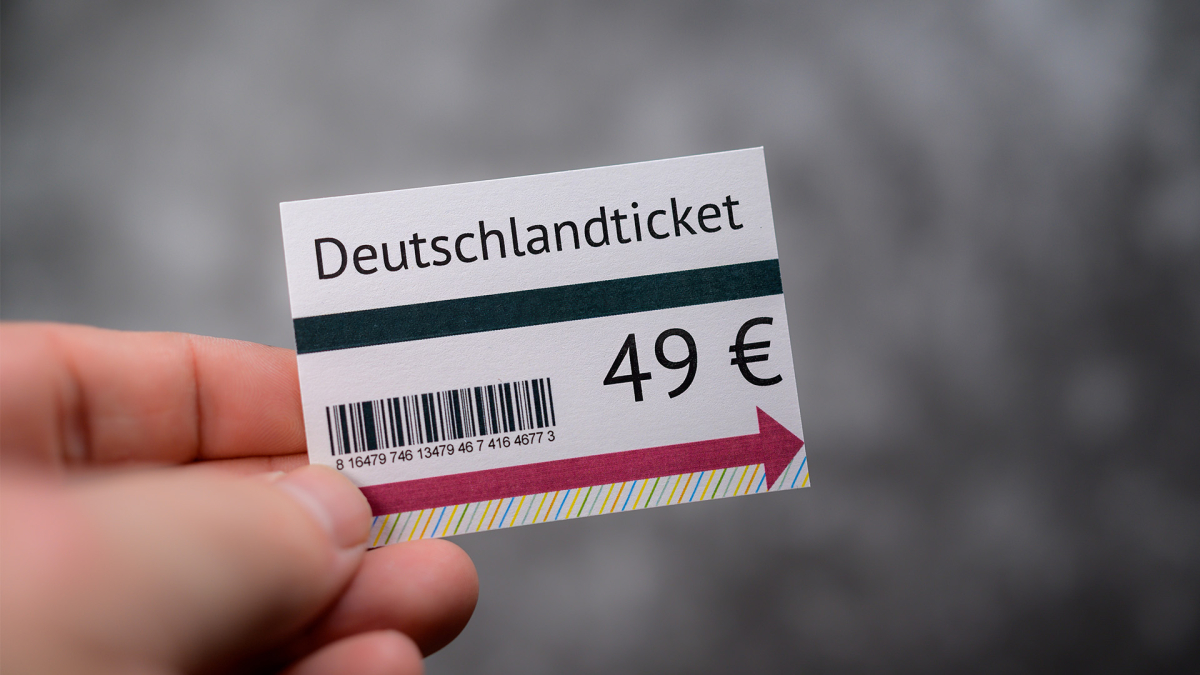Everything you need to know about the Deutschlandticket
May 1st, 2023: Deadline for the validity of the Deutschlandticket. That’s the official name of the 49-euro ticket. It has been sold since April 2023, although the Federation of Consumer Organizations complained about problems such as the complicated purchase and the obligation to subscribe. But not only the purchase process, but also validity and a Schufa query raise questions.
The 49-euro ticket is valid on a monthly basis, so it cannot be used flexibly beyond the end of the month. It is not transferable and there are a few things to consider when booking and using it. In order to identify yourself, an official photo ID is required for journeys with the Deutschlandticket for identification during ticket checks.
Contents
- 1 Where is the 49 euro ticket valid and where is it not valid?
- 2 Can I take a bicycle, my dog, children and other companions with me?
- 3 I already have a subscription to a network. Do I have to cancel this or does it change?
- 4 Where will the ticket be available? Does it matter where, through whom and how I book the ticket?
- 5 How long do I have to book the ticket and when do I have to cancel at the latest?
- 6 Why is there a Schufa query?
- 7 How can companies make the 49-euro ticket even cheaper?
- 8 Will there be more perks?
- 9 For whom is the 49-euro ticket worth it?
- 10 Do Bahncard 100 holders also need the 49-euro ticket?
- 11 Will it stay at the price of 49 euros for now?
Where is the 49 euro ticket valid and where is it not valid?
Basically, the ticket should be a kind of flat rate for local public transport, so it is valid in principle in all transport associations as well as in Germany-wide rail traffic of the Deutsche Bahn, but here only in the local trains (i.e. not in ICE, IC, EC and other trains of the DB long-distance traffic ), each only in the second class. An upgrade to first class is excluded, as is partial use of long-distance transport, for which the full fare must be paid. Basically excluded are individual private bus services as well as the museum and private railways and Flixbus and Flixtrain in general.
The rules that apply in the respective network apply here, which can be a real challenge, especially on longer routes, because you may only need your own ticket for certain parts of the route, for example for the dog. There are no plans to take children over the age of six or other accompanying persons with you (children under the age of six don’t have to pay a ticket anyway). You usually have to pay extra for the bike too – with the exception of folding bikes up to a certain size. Details on the size and the question of whether the part has to be folded up are regulated by the respective associations themselves.
This also depends on the respective transport company. In many cases, the subscription you already have offers more generous carry-out rules, such as on weekends. Therefore, in many cases, the cards are only changed upon request. However, the transport associations have an interest in making the changeover in an accommodating manner so as not to risk passengers buying the Deutschlandticket from another transport company in the future, which will then initially have the income (which will be redistributed afterwards).
The ticket, which can be canceled monthly, can be purchased via the respective apps of the associations and via the associated customer centers and should primarily – but not exclusively – be available digitally. If you do not have a suitable smartphone, you can also get the ticket as a chip card, or initially as a paper ticket until the chip card is available. The amount is debited from the account on a monthly basis, other payment methods are not planned.
Editor’s Recommendations
In principle, there is only one Germany ticket that you can book everywhere under the same conditions. However, this also means that the transport associations are courting customers, for example with certain apps such as the “Dein Deutschlandticket” app from the developer Mobility Inside.
As a rule, the ticket must be booked by the 25th of a month so that it can be delivered for the following month, but in some places the railways already indicate the 10th of the previous month if a chip card is required.
It remains unclear why this is the case, since in principle it is a digital ticket that should in principle be available within a few minutes with the corresponding completely automatic digital sales solution (if the Schufa information is correct). However, it could be that improvements will be made here in the next few months, since such a ticket can also be useful in the course of the month and will pay for itself if used accordingly.
The price for the ticket is debited monthly, so that the Schufa query is not really explained. Because the risk for the transport company is just 49 euros for the next installment. Conversely, an insufficient Schufa score, no matter how high it is for a rejection, disadvantages those customers who have not met their payment obligations in the past.
The federal and state governments as well as the transport associations have announced that they want to reduce the price of the ticket by another five percent in the form of a company ticket if the employer reduces the tickets collectively for his employees by a further 25 percent. Specifically, this means that employees can get the ticket discounted by at least 30 percent. This is attractive for many companies because they have already paid a subsidy for the job ticket. The human resources department can tell you whether your employer is involved. In particular, if a subsidy is included in the contract as a salary component, this should be possible.
Some federal states and transport associations are planning special social tickets or discounted tickets for certain groups of people. In Saarland and Bavaria, for example, there will be a reduced ticket for 29.00 euros or 30.40 euros for young people under certain conditions, in other regions something like this could come.
Solutions for students who have already had semester tickets in the past are also still to be negotiated. However, since these were negotiated very differently in each case, it is best to find out on site. In some cases, the (cheaper) semester ticket can remain valid with reduced validity or make sense due to rules on what to take with you. In addition, a nationwide solution is to be developed with the respective representatives of the student unions.
It is not yet clear whether there will be special monthly passes for bicycles, for taking pets with you or for other special cases. It is clear, however, that family members are not allowed to travel free of charge, so that each member (at least six years old) will need their own ticket.
Of course, commuters benefit the most if they have had to combine several tickets in view of the previous small-scale association. In the past, anyone commuting from Mannheim to Frankfurt had a monthly ticket for the Mannheim MVV, the Hessian RMV and the local or long-distance train ticket. This is now much easier and probably cheaper even for ICE commuters.
Since this week it has been clear that the previous regulation that the Bahncard 100 cannot be used for all local transport (e.g. buses in the country that do not belong to any network) is obsolete. The federal government announced this week that the Bahncard 100 will be expanded accordingly.
But even those who don’t travel by bus or train every day benefit financially (and protect the environment). A state ticket – the day ticket for local public transport in a federal state – used to cost around 25 euros plus a few euros for additional passengers. Even in rural areas, it can pay off to drive to a park-and-ride parking lot and save on expensive parking fees in the big city.
That too is not certain. The federal and state governments agree for the time being on the joint financing of the ticket at a price of 49 euros. Both sides are providing 1.5 billion euros for this. Possible additional costs for the transport companies due to loss of income in the introductory year are also borne jointly. For the years after 2023, the federal and state governments want to jointly examine how financing can be secured from the agreed subsidies and the revenue from fares. It is therefore to be feared that a price increase is imminent as early as 2024.



